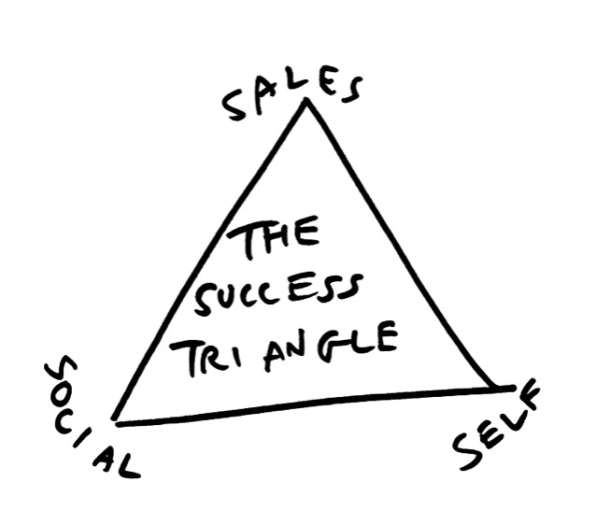1. Sales success is about getting people to buy something you’ve created. Your book is a commercial hit! Everybody’s reading it, everybody’s talking about it, you’re on TV. You sell hundreds and then thousands and then millions of copies. Dump trucks beep while backing into your driveway before pouring out endless shiny coins as royalty payments. Sales success is about money. How much did you sell?
2. Social success means you’re widely recognized among your peers and people you respect. Critical success. Industry renown! To extend the book example, let’s say the New York Times reviews your latest novel and some writers you respect send you letters saying they thought the book was great (whether or not it’s a commercial hit).
3. Self success is in your head. It’s invisible. Only you know if you have it, because it corresponds to internal measures you’ve established on your own. Self success means you’ve achieved what you wanted to achieve. For yourself. You’re proud and satisfied with your work.
These three categories are broad and approximate but I think that’s why they’re useful: Chances are good that any major achievement you reach will fall more clearly into one than another. They apply to pretty much all industries, professions, and aspects of life.
The point is that success is not one-dimensional.
In order to be truly happy with your successes, you first need to decide what kind of success you want.
Are you in marketing? Sales success means your product flew off the shelves and your numbers blew away forecasts. Social success means you were written up in prestigious magazines, nominated for an award, or shouted out by the CEO at the all-hands meeting. Self success? That’s the same: How do you feel about your accomplishments?
Are you a teacher? Sales success means you’re offered promotions based on your work in the classroom because the bosses want to magnify and implement your work more widely. You’re asked to become a Vice Principal or Principal. Social success means educators invite you to present at conferences, mentor new teachers, and the superintendent recognizes you for your work. Self success? Again: How do you feel about your accomplishments?
There is a catch, though.
I believe it’s impossible to experience all three successes at once.
Picture the triangle above like one of those wobbly exercise planks at an old-school gym. If you push down on two sides, the third side lifts into the air. In our lives and work, it’s rare that any given thing we do — any single success we achieve, no matter how great — can satisfy ourselves and others in equal measure. Aspiring to that, if you ask me, is a mistake.
Sales success, for instance, can block self success. That’s what happened to me as a writer when I got hooked on bestseller lists, blog stats, and brand extensions. Personal goals took a backseat to more tangible commercial ones. I started making things because I was asked to and not because I wanted to. Sure, the saying goes “make hay while the sun shines,” and I’m not saying there’s anything wrong with chasing commercial success, but I’m pointing out that if that’s your north star it can distract or block you from chasing deeply personal goals.
Look at it the other way.
Personal goals don’t necessarily have a marketable strategy so no sales or social success may follow. I’m talking about making that triple-decker chocolate birthday cake you bake for your daughter, the incredible twelfth grade chemistry lesson you put your heart into for weeks, the backyard deck you built with your bare hands. You wouldn’t expect royalty payments or critical reviews from those endeavors. You’re not trying to sell cakes, lesson plans, or decks. You could! But that wasn’t your goal.
And, finally, let’s peek at this from a final view. Critical darlings often sell poorly. You see this almost every year at the Oscars. Spotlight wins Best Picture — tense, dramatic, wonderful acting. How much did it gross at the domestic box office? $45 million. That same year Furious 7 made $353 million.
Which would you have rather made?
There is Sales, Social, and Self success.
Spend time thinking about which one you want and then go.
Good luck!

